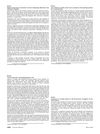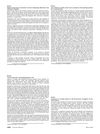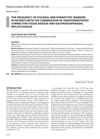 February 2022 in “International journal of KIU”
February 2022 in “International journal of KIU” Certain genes and nutrients like vitamin D, zinc, and omega fatty acids affect COVID-19 severity and infection risk.
 3 citations,
January 2007 in “Elsevier eBooks”
3 citations,
January 2007 in “Elsevier eBooks” The document concludes that individualized treatment and lifestyle changes are important for managing menopause symptoms and health risks.
 5 citations,
May 2023 in “Frontiers in immunology”
5 citations,
May 2023 in “Frontiers in immunology” Environmental factors like diet and vitamin levels, especially Vitamin D, can affect autoimmune diseases differently, with lifestyle changes potentially improving outcomes.
 May 2023 in “Australasian Journal of Dermatology”
May 2023 in “Australasian Journal of Dermatology” Various substances, including cosmetic sponges, vein glue, chai tea, skincare products, and medicaments, can cause allergic contact dermatitis, and healthcare workers often react to N95 masks.
 June 2018 in “Disease-a-Month”
June 2018 in “Disease-a-Month” Remove inflamed cysts surgically, avoid topical antibiotics on wounds, treat skin and mouth conditions with specific medications, and address underlying causes of hair loss.

Topical treatments like minoxidil and corticosteroids are effective for hair loss, with JAK inhibitors promising for alopecia areata.
 November 2023 in “Curēus”
November 2023 in “Curēus” Eating junk food is linked to higher rates of PCOS and related symptoms in women.
 4 citations,
October 2021 in “Canadian Journal of Physiology and Pharmacology”
4 citations,
October 2021 in “Canadian Journal of Physiology and Pharmacology” Women with pancreatic cancer are more likely to have certain side effects from chemotherapy than men.
 81 citations,
January 2011 in “European Journal of Internal Medicine”
81 citations,
January 2011 in “European Journal of Internal Medicine” Despite progress, better treatments and understanding are needed for the high rates of long-term issues and deaths linked to eating disorders.

Stress significantly contributes to hair loss, especially in women and those aged 31-40.
 12 citations,
February 2023 in “Journal of Personalized Medicine”
12 citations,
February 2023 in “Journal of Personalized Medicine” Type 1 diabetes often occurs with other autoimmune diseases, and personalized treatment based on genetics can improve outcomes.
 April 2021 in “Journal of Investigative Dermatology”
April 2021 in “Journal of Investigative Dermatology” PRP treatment helps hair growth and reduces hair loss in women, but more research needed.
 89 citations,
June 2012 in “Anais Brasileiros de Dermatologia”
89 citations,
June 2012 in “Anais Brasileiros de Dermatologia” Actinic keratosis can lead to skin cancer, is more common in fair-skinned people, and can be reduced with sunscreen and treated effectively.
 13 citations,
August 2018 in “Journal of Molecular and Cellular Cardiology”
13 citations,
August 2018 in “Journal of Molecular and Cellular Cardiology” Finasteride improves heart function and repairs damage after heart attack in mice.

Online tools are effective and cost-efficient for recruiting dermatology research participants, especially among younger people.
 February 2024 in “Journal of the American Academy of Dermatology”
February 2024 in “Journal of the American Academy of Dermatology” Vascular patterns in dermoscopy help tell apart malignant and benign skin tumors.
 91 citations,
April 2017 in “Diabetes & Metabolic Syndrome: Clinical Research and Reviews”
91 citations,
April 2017 in “Diabetes & Metabolic Syndrome: Clinical Research and Reviews” Eating fewer calories, less sugar and refined carbs, and more low-glycemic and omega-3 rich foods can help manage PCOS symptoms.
 5 citations,
January 2020 in “Wiadomości lekarskie (Warsaw Poland)”
5 citations,
January 2020 in “Wiadomości lekarskie (Warsaw Poland)” Patients with both connective tissue disease and acid reflux are more likely to have certain symptoms and physical signs.
 4 citations,
January 1974 in “The BMJ”
4 citations,
January 1974 in “The BMJ” All medications can cause skin rashes, often without a clear cause, and better tests are needed to identify these drug-related skin issues.
 67 citations,
November 2019 in “Molecules”
67 citations,
November 2019 in “Molecules” Tea, especially green tea, shows promise in cosmetics for skin and hair benefits but more research is needed for effective use.
January 2023 in “Applied sciences” Equisetum debile extracts may help with skin whitening, anti-wrinkle, and anti-hair loss treatments.
 11 citations,
December 2020 in “Notulae botanicae Horti Agrobotanici Cluj-Napoca”
11 citations,
December 2020 in “Notulae botanicae Horti Agrobotanici Cluj-Napoca” Mycorrhizal fungi and shading improve tea plant growth and nutrient uptake by changing hormone levels and gene expression.
 183 citations,
January 2018 in “Cosmetics”
183 citations,
January 2018 in “Cosmetics” Essential oils in cosmetics can offer benefits but may cause allergies and should be used carefully.
 21 citations,
May 1976 in “Archives of Dermatology”
21 citations,
May 1976 in “Archives of Dermatology” Stopping fluoride toothpaste use might improve perioral dermatitis.
 December 2024 in “Research Journal of Pharmacy and Technology”
December 2024 in “Research Journal of Pharmacy and Technology” Seablite root extract may help prevent hair loss and promote hair growth.
 7 citations,
April 2017 in “Health Economics, Policy and Law”
7 citations,
April 2017 in “Health Economics, Policy and Law” The document suggests reevaluating the patent system to ensure public benefits from pharmaceutical privileges and to encourage more significant innovations.
 1 citations,
January 2001 in “Dermatologic Surgery”
1 citations,
January 2001 in “Dermatologic Surgery” Pulsed dye laser and hydrogel dressings effectively treat hypertrophic scars.
 28 citations,
September 2013 in “Expert Opinion on Therapeutic Patents”
28 citations,
September 2013 in “Expert Opinion on Therapeutic Patents” New resveratrol-related compounds show promise for treating various health issues but need more research for clinical use.
 11 citations,
May 1976 in “Archives of Dermatology”
11 citations,
May 1976 in “Archives of Dermatology” Starving yourself can cause hair loss, but stopping the diet can improve it.
 14 citations,
August 2012 in “Clinics in Dermatology”
14 citations,
August 2012 in “Clinics in Dermatology” In the Middle Ages, European noblewomen intentionally removed forehead hair to be fashionable, showing how beauty standards can affect the perception of hair loss.





























